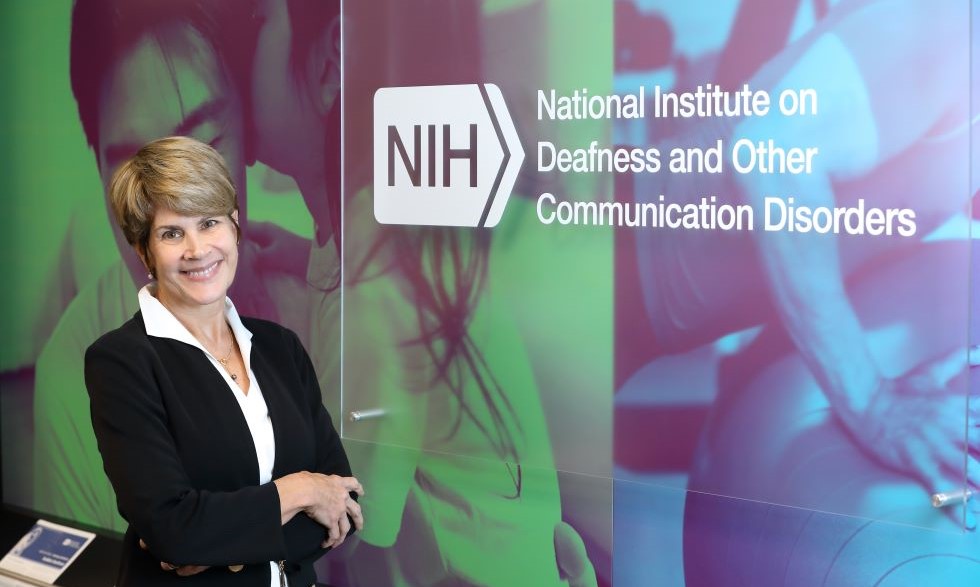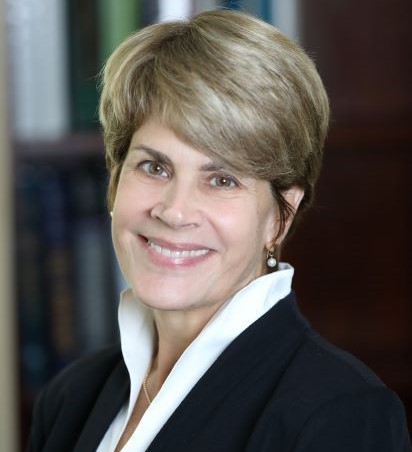
Last updated on June 27th, 2024 at 11:35 am
Debara L. Tucci, M.D., M.S., M.B.A., is excited by opportunities to encourage and support research that can enhance human communication. As Director of the National Institute on Deafness and Other Communication Disorders (NIDCD), it’s her job to bring together scientists and other experts who are trying to improve our understanding of these conditions. She spoke to NIH MedlinePlus Magazine about her path to NIDCD and what she hopes the future will bring to this area of medicine.
What brought you to the field?
I’ve dedicated my career to understanding the causes and impact of hearing loss and to developing treatments to restore hearing. I began my career as a clinical audiologist at the University of Virginia (UVA) Health Sciences Center. Next, I attended medical school at the UVA School of Medicine to become an otologist (a physician or surgeon who specializes in the structure and diseases of the ear). After my residency at UVA, I completed a clinical fellowship in otology, neurotology (the study of the ear’s connection to the brain and nervous system), and skull base surgery at the University of Michigan.
As an otolaryngologist surgeon-scientist, I treated individuals with ear, hearing, and balance challenges. I’ve always had a passion for research. It gives me hope that with more scientific progress in the field of communication disorders, we could help even more people.
How did you end up at NIDCD?
My path to NIDCD started nearly 30 years before I became the institute’s Director in 2019. I had advised NIDCD for many years by participating on boards, committees, and working groups. The move was seamless because of the exceptional NIDCD workforce. We have made progress on many exciting initiatives by working together. I look forward to continued progress toward our shared vision in the coming years.
How would you describe the mission and focus of NIDCD?
Our vision statement so clearly explains what NIDCD does and why: “Advancing the science of communication to improve lives.” NIDCD conducts and supports research and research training in the normal and disordered processes of hearing, balance, taste, smell, voice, speech, and language.
Think about the many ways communication connects us to each other and to the world. And consider that communication conditions and disorders will affect a growing part of the population, especially as the U.S. population ages in the coming years. Now you can imagine the range and impact of NIDCD’s research. The institute began in 1988, so it is young by NIH standards, but we’ve accomplished so much.
What research are you particularly excited about?
I’m delighted about the research focus and direction described in our 2023–2027 NIDCD Strategic Plan. This is a collaboration between NIDCD, the scientific community, members of the public, and professional organizations. It addresses major themes to drive our work over the next five years.
One theme that I’m particularly excited about is a new focus on precision medicine research that could accelerate the development of patient-centered treatments for people with sensory and communication disorders. I’m also looking forward to seeing how interdisciplinary teams can harness large data sets using artificial intelligence and machine learning. This data-driven discovery could provide novel insights into prevention, diagnosis, and treatment for individuals with deafness and communication disorders.
How is NIDCD working to close health disparities gaps and promote diversity, equity, inclusion, and accessibility in and outside the institute?
Diverse teams are important for so many reasons: They are more creative and innovative. They’re more likely to ensure that clinical trials include underrepresented groups. And they’re better able to address questions that are meaningful to all communities.
NIH has a long history of supporting professional advancement for underrepresented minorities and building and sustaining a diverse workforce. These have also been among my chief priorities since coming to NIDCD. Our new Chief Diversity Officer, Cendrine D. Robinson, Ph.D., M.P.H., is strengthening our diversity, equity, inclusion, and accessibility strategy. She’s helping us broaden and deepen our understanding of structural barriers to equity in the biomedical workforce and helping identify how these issues impact our work. She also ensures that our plans consider accessibility issues for those with disabilities, including hearing loss.
Other examples include our diversity-targeted R25 programs. These aim to enhance mentoring networks and provide research opportunities. Another program supports newer scientists from diverse backgrounds to conduct research in any of our scientific areas. And the NIDCD Diversity Scholars Program helps researchers apply for supplemental funding to add students, postdocs, and eligible faculty from diverse backgrounds to their labs.
In addition to these efforts, we have championed initiatives to ensure that treatments for communication disorders are accessible and affordable. One recent example is the new availability of over-the-counter hearing aids. This FDA rule change provides easier access to affordable, safe, and effective hearing aids for adults who believe they may have mild to moderate hearing loss. We hope this will prompt those who could benefit from hearing aids to try them.
Why is NIDCD involved in the NIH INCLUDE Project on co-occurring conditions for Down syndrome?
The INvestigation of Co-occurring conditions across the Lifespan to Understand Down syndromE (NIH INCLUDE) Project aims to address critical health and quality-of-life needs of people with Down syndrome who may have hearing problems and difficulty with speech and language. The initiative offers NIDCD researchers the opportunity to explore factors that contribute to these problems. Since the program’s launch, we’ve seen scientific progress that could change the lives of those with Down syndrome and their families.

Outside of work, Dr. Tucci enjoys traveling abroad and spending time with her husband and children.
What is something that you wish more people knew about NIDCD?
It’s important to me that more people understand NIDCD’s broad mission. Our research extends beyond hearing loss, including a wide range of issues related to taste, smell, voice, speech, and language (both spoken and signed). We also look at balance disorders, which are related to inner ear function.
For example, our research contributed to understanding how SARS-CoV-2, the virus that causes COVID-19, affects our senses of taste and smell. We were part of NIH’s Rapid Acceleration of Diagnostics Radical (RADx®-rad) program, which supports new, non-traditional, and reimagined uses of tools that address gaps in COVID-19 testing and surveillance.
NIDCD also supports research on speech and language abilities and differences in individuals with autism spectrum disorder (ASD). This includes studies to improve early diagnosis and develop effective treatments that address the communication challenges faced by people with ASD.
What are some of your favorite things to do when you’re not working?
I love to travel with friends and experience different cultures. I have a personal interest in global health and have colleagues all over the world. I enjoy visiting them and learning about their work, personal interests, and passions. I also enjoy spending time with my family. My husband is a neurologist (a doctor who specializes in the brain and nervous system), and we have three adult children. When I’m not working, I love to cook, read, and hike.
